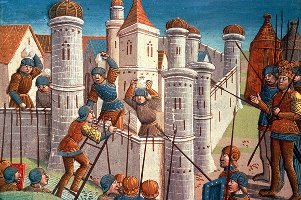
A Siege of Constantinople, Ogier le Danois, 1499, from the Bridgeman Art Library. Yes, Constantinople looked exactly like that.
When I was in the fourth grade, we studied Alabama history from a textbook that would probably raise a few eyebrows, were it to reappear today.
Written in the middle of the twentieth century, the book presented the topics of race, politics and economics from a viewpoint that would have seemed perfectly familiar eighty years earlier: slavery was bad for the victims, yes, but they were better off than if they’d been left in Africa without underwear or Jesus; the Civil War was a conflict between the Northern industrial worldview and its Southern agricultural counterpart, with the former attempting to impose itself forcibly on the latter; the economic inferiority of the modern South had nothing to do with lack of education or the rampant inequality of wealth, but was rather due to the pernicious interference in Southern affairs by the Northern-dominated federal authorities.
Don’t get me wrong — not every insinuation was necessary without merit: Reconstruction was brutal, war is always political and cultural, and the terrible institution of slavery was originally brought to this country by the very men and women we revere as its founders, in both North and South. The view through the prism of resentment and isolation, however, was undeniably distorted, and the march of time everywhere else in the world had only made the peculiarities more noticeable.
Fast forward to today: I’m reading a history of Byzantium by Sir Charles William Chadwick Oman (published in 1892) that I downloaded to my Nook from Project Gutenberg. Compared to the 1,400 or so pages on the subject by John Julius Norwich that I already own, this book, at about 250 pages, is hardly more than a Cliffs Notes summary, but it’s a pretty interesting read if you’re into this sort of thing.
Apart from the varying scale of the two works, however, another significant difference jumps out very quickly. The three-volume Norwich history was written during the last two decades of the 20th century, while Oman published his contribution at the end of the 19th: whereas the Viscount Norwich makes some effort to provide an overview of the events of the thousand-year history of the Byzantine Empire without offering a moral or cultural interpretation, Sir Charles makes no bones about where his sympathies lie, every step of the way.
“[My] Researches are here set down to preserve the memory of the past by putting on record the astonishing achievements both of our own and of other peoples …”
Herodotus of Halicarnassus
“I write these things as they seem true to me; for the stories told by the Greeks are various and in my opinion absurd.”
Hecataeus of Miletus
The nineteenth century English-speaking world was one where geography, religion and morality were inextricably linked. In any conflict between Christians and non-Christians, the Christians wore the white hats. If the fighting was North versus South, the North was industrious and godly, while the South was decadent and demented by the heat. Asia began at Belgrade, and the further east one travelled, the more heathen and inscrutable the people became, and the more likely they were to be Bad Guys. (The world being round, the furthest extreme of any West-to-East axis of evil was — naturally — Ireland.)
• When the heretic barbarian Goths overcame the mainstream Christian Romans in Italy and the Balkans, it was only through some terrible lapse on the part of the defenders. The idea that the Goths may have simply been braver, or smarter, or more motivated on the battlefield just isn’t worth entertaining.
• When the sinister fire-worshipping Persians trampled the God-fearing Byzantines in Antioch and Jerusalem, it was because of the weather, or plague, or treachery, but when the Westerners won, we know it was because they were superior people, from a superior culture.
• Attila and his swarthy, slant-eyed hordes didn’t overrun Europe virtually unopposed because they were incredibly energetic and utterly fearless, united firmly behind a bold leader, it was because the Empire was tired and just needed to catch its breath. The superiority of the Europeans was a given, regardless of how badly they lost every contest.
All this this racial and religious prejudice seem very obvious to me now, more than a century later, but I have to wonder: does Norwich’s take on the same events seem so much more balanced and impartial because it really is, or does it look that way because he is of a time and place more akin to my own, so that whatever prejudices he brings to the work are my prejudices also, and therefore invisible to me?
I remember an issue of National Geographic from somewhere in the late sixties which featured an article on Iran — our faithful ally Iran, ruled by a fatherly and benevolent Shah, West-leaning, enlightened, a model for the Muslim world. It was all pretty uplifting, and made Tehran sound like a suburb of Philadelphia. In retrospect, we know that the Shah was a dictatorial and unpopular ruler, and that a great many Iranians clearly did not want to live in a suburb of Philadelphia. Films we saw in school about South Africa sang the praises of this Westernized nation, the economic powerhouse of Africa, while somehow failing to convey the fact that the driving energy of the machine was a vast army of non-European slave-laborers, isolated and repressed by a white minority. The picture of Iran and South Africa that we were seeing was wildly distorted, but at the same time deeply plausible: our own underlying prejudices made it easy for us to accept the distortions. We never looked for answers to questions it never occurred to us to ask.
In every era, people have looked at the old histories and marvelled at their ancestors’ skewed view of events. We laugh at the inconsistencies, we are horrified by the misconceptions — yes, we see farther because we stand on the shoulders of giants, but these are fairy-tale giants, hairy and uncouth. From our superior sophistication and insight we see their world as it really was, not the funhouse reflection that they themselves looked out upon.
You can see where this is going.
A hundred years from now, or fifty, or five hundred, how foolish will we look when our descendants read through our textbooks, or our newspapers — or this blog? No matter how dispassionate I believe myself to be, no matter how I strive for a clear-eyed and impartial view of my world, in the end I’m only looking in a mirror. The world I see is the world I am capable of seeing, nothing more. My personal limitations restrict just what I can see, and how far, and how deeply: my own reflection is always going to block part of the view.
That said, what’s to be done? Descartes reduced the universe to “I think, therefore I am”, but that’s hardly a basis on which to vote, choose which brand of milk to buy, or build a personal ethos. We have to make do with the vision we have, however impaired, and do our best to see and think as clearly as our minds and hearts will permit. Maybe the only rule should be “I think, therefore I can try my very best to be honest with myself.” We will fail, because the funhouse mirror will always be an imperfect vehicle for viewing the universe, but the very effort makes us better.
And whenever we slip up and forget, History (with a capital “H”) is there to remind us that the more absolutely right we think we are, the more appalled our great-grandchildren are going to be by just how amazingly wrong we were.
[Many thanks to Wikipedia for the quotes from Herodotus and Hecataeus.]
* * *



Leave a Reply